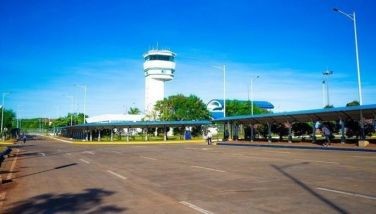Going, going, sold
July 15, 2002 | 12:00am
Three times a year, the Quezon City office of United Auctioneers Inc. comes alive. Everybody–from president Dominic Sytin to the guard at the gate–has his own set of chores, whether it is working on computer terminals or tallying names and numbers or sorting out piles of paper and booklets with big white-on-blue numbers.
Three times a year, UAI auctions off imported second-hand heavy equipment, trucks, buses and utility vehicles. The rest of the year, the workload is more laid back as Sytin and his staff look for suppliers, arrange shipments of consigned products, pay custom duties and fix the merchandise.
"This business is merely another form of selling," Sytin said when asked what sets his business apart from traditional enterprises. "It is just new here. In countries like the United States, Japan, Canada, Singapore, Thailand and Indonesia, auctions are done almost weekly."
One of the largest auctioneers in the country, UAI leases two yards in the Subic Bay Freeport, spanning 7.5 hectares, and two other properties–one in Meycauayan, Bulacan and another in Malinta, Valenzuela–where the items for auction are kept.
UAI was born out of crisis.
During the 1997 Asian financial meltdown, Sytin, an importer/dealer of used trucks since 1990, found himself with a yard full of non-moving stock. Taking a cue from the Subic auctions that used to be conducted by American company, Ritchie Bros, he decided to auction his unwanted stock.
"It was a bitter pill that I had to swallow. I decided to swallow it early on because, if I hesitated, my business may be dead before I knew it," he said.
Sytin was able to sell his trucks at prices just high enough to pay his bank loans. Months later, other truck importers with so-called dead inventories asked him to sell their stocks through auction. It was then that Sytin incorporated UAI. Soon, UAI got trucks and heavy equipment from Japan-based consignors.
"Right now, more than 90% of our stocks are consigned. We earn a 6% commission from each sale. It is still hard to make big money here because the cost of advertising, the land lease and the wages of people keep on going up," he said.
Historically, the majority of the more than 2,000 people who troop to his three-day auctions are owners of construction companies and government officials. For them, the auctions are their only chance to get expensive equipment at prices they can afford.
"The items we auction are sold for as low as P5,000 for a high-impact drill to P3.5 million for a 50-ton crane used in building high-rise structures and bridges. You cannot get these items anywhere at such low pries. That’s why more than 70% of the people who come to us are repeat customers," he said.
UAI is holding another three-day auction on July 17-19.
To participate in an UAI auction, an individual must first register with the auctioning company and then pay a P100,000 refundable deposit. Each participant is given a booklet containing all the lots up for bidding. Each booklet has a number on the cover to identify the bidder.
On auction day, the auctioneer starts off by announcing that a specific item–which is normally paraded in front of the bidders–is now available for bidding.
Since UAI has a no-minimum bid policy, the auction stops as soon as the bidding ceases, with the item going to the one who posted the highest bid. The process is festive and exciting, with the auctioneer barking on the microphone like a race announcer.
To maintain the integrity of its auction , UAI maintains a no-buyback policy. "No buyback means we don’t have anyone in the audience who poses as a bidder. In other auction companies, they manipulate the bidding because they want to keep the prices at a certain level. If the bid doesn’t come up to such a price, the poseur bidder shouts a bid and the item ends up being bought back by the auctioneer. We don’t do that at UAI," he said.
Because auctions are picking up in the country, some fly-by-night companies have jumped into the bandwagon, selling poor quality imports that lack the necessary papers. These companies also do not pay the right amount of taxes.
"In auctions, the buyers get value for their money. And you get to know what items the market deems important. Auctions epitomizes the concept of free market where the buyers and not the sellers dictate the price. That’s the way it should always be," he said.
Three times a year, UAI auctions off imported second-hand heavy equipment, trucks, buses and utility vehicles. The rest of the year, the workload is more laid back as Sytin and his staff look for suppliers, arrange shipments of consigned products, pay custom duties and fix the merchandise.
"This business is merely another form of selling," Sytin said when asked what sets his business apart from traditional enterprises. "It is just new here. In countries like the United States, Japan, Canada, Singapore, Thailand and Indonesia, auctions are done almost weekly."
One of the largest auctioneers in the country, UAI leases two yards in the Subic Bay Freeport, spanning 7.5 hectares, and two other properties–one in Meycauayan, Bulacan and another in Malinta, Valenzuela–where the items for auction are kept.
During the 1997 Asian financial meltdown, Sytin, an importer/dealer of used trucks since 1990, found himself with a yard full of non-moving stock. Taking a cue from the Subic auctions that used to be conducted by American company, Ritchie Bros, he decided to auction his unwanted stock.
"It was a bitter pill that I had to swallow. I decided to swallow it early on because, if I hesitated, my business may be dead before I knew it," he said.
Sytin was able to sell his trucks at prices just high enough to pay his bank loans. Months later, other truck importers with so-called dead inventories asked him to sell their stocks through auction. It was then that Sytin incorporated UAI. Soon, UAI got trucks and heavy equipment from Japan-based consignors.
"Right now, more than 90% of our stocks are consigned. We earn a 6% commission from each sale. It is still hard to make big money here because the cost of advertising, the land lease and the wages of people keep on going up," he said.
"The items we auction are sold for as low as P5,000 for a high-impact drill to P3.5 million for a 50-ton crane used in building high-rise structures and bridges. You cannot get these items anywhere at such low pries. That’s why more than 70% of the people who come to us are repeat customers," he said.
To participate in an UAI auction, an individual must first register with the auctioning company and then pay a P100,000 refundable deposit. Each participant is given a booklet containing all the lots up for bidding. Each booklet has a number on the cover to identify the bidder.
On auction day, the auctioneer starts off by announcing that a specific item–which is normally paraded in front of the bidders–is now available for bidding.
Since UAI has a no-minimum bid policy, the auction stops as soon as the bidding ceases, with the item going to the one who posted the highest bid. The process is festive and exciting, with the auctioneer barking on the microphone like a race announcer.
To maintain the integrity of its auction , UAI maintains a no-buyback policy. "No buyback means we don’t have anyone in the audience who poses as a bidder. In other auction companies, they manipulate the bidding because they want to keep the prices at a certain level. If the bid doesn’t come up to such a price, the poseur bidder shouts a bid and the item ends up being bought back by the auctioneer. We don’t do that at UAI," he said.
Because auctions are picking up in the country, some fly-by-night companies have jumped into the bandwagon, selling poor quality imports that lack the necessary papers. These companies also do not pay the right amount of taxes.
"In auctions, the buyers get value for their money. And you get to know what items the market deems important. Auctions epitomizes the concept of free market where the buyers and not the sellers dictate the price. That’s the way it should always be," he said.
BrandSpace Articles
<
>
- Latest
Latest
Latest
May 2, 2025 - 9:48am
May 2, 2025 - 9:48am
April 29, 2025 - 4:38pm
April 29, 2025 - 4:38pm
April 28, 2025 - 12:50pm
April 28, 2025 - 12:50pm
Recommended



























